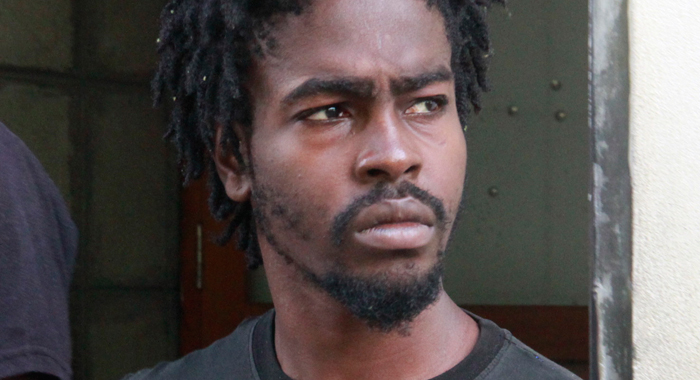The impact of the absence of proper psychiatric services in St. Vincent and the Grenadines continued was felt again on Friday as the court sentenced a mentally ill man who stabbed and killed a woman in Kingstown in 2018.
Justice Brian Cottle noted that the psychiatric evaluation conducted on Kesean Caine, then 19, did not opine on the level of mental responsibility he retained when he stabbed and killed Brenda Layne, 48, in an unprovoked attack.
Cottle ordered that Caine be detained during the court’s pleasure and be treated for his medical condition.
He is to return to court after three years, when the court would determine if he is fit for release.
If Caine is unfit for release, he will be evaluated in another three years’ time and so on.
Caine was initially indicted for murder but pleaded guilty to manslaughter by reason of diminished responsibility and the Crown accepted the plea.
The facts of the case, as outlined by the judge, are that Caine stabbed Layne, a security guard, of Chauncey, originally of Rillan Hill, as she was standing in Kingstown on Aug. 22, 2018.
Layne had worked the night shift and was standing on Bay Street around 6:30 a.m. awaiting transportation home, when Caine approached her from behind and suddenly stabbed her in the neck.
The judge noted that the attack was completely unprovoked and Caine fled the scene after inflicting the fatal injury. Layne was taken to the Milton Cato Memorial Hospital, where she died.
As part of their investigation, police obtained CCTV footage, which showed Caine approaching Layne and inflicting the single stab wound then fleeing the scene.
He was arrested a few moments later and admitted to committing the acts. However, investigators were concerned about his mental state and took him for a psychiatric evaluation.
The evaluation was conducted six hours after the killing and the doctor concluded that Caine was impaired and unfit to be interviewed by the police at the time.
The doctor concluded that Caine’s judgement was impaired and he had no insight into his mental state. He was delusional and having auditory hallucinations.
The doctor concluded that Caine was suffering from polysubstance abuse-induced psychosis but was oriented as to time, place and person. Caine was treated and by Oct. 14, 2018 had recovered enough to be deemed fit to stand trial and pleaded guilty to manslaughter.
The judge noted that the criminal code says that a person who kills shall not be convicted of murder if he was suffering from such abnormality of mind as substantially impaired his mental responsibility for his acts in doing, or being a party to, the killing.
The law says such a person should be convicted of manslaughter by reason of diminished responsibility.
Justice further said that the court may, instead of or in addition to another criminal punishment for manslaughter, order that the convicted person be detained during the pleasure of the court. The jurist noted the aims of criminal sentencing, namely retribution, deterrence, prevention and rehabilitation.
He said that as the court strives to balance those competing aims, as former Chief Justice Rawlins noted, the court must consider the facts and circumstances surrounding the commission of the offence and the character and record of the offender.

Justice Cottle said that manslaughter is a serious one and reflects the fact that human life is lost, with the maximum sentence being life imprisonment.
He said that while the court has sentencing guidelines for manslaughter, there is none for manslaughter for diminished responsibility.
Caine was represented by lawyers Jomo Thomas and Shirlan “Zita” Barnwell while Tamika Da Silva-McKenzie, an assistant director of public prosecution, appeared for the Crown.
He said that the prosecution submitted that the court should apply the guidelines regarding manslaughter by reason of an unlawful act, using the UK guidelines for manslaughter by diminished responsibility as a template.
The defence, however, urged the court to consider the UK guidelines only as they pertain to the factor that the court should consider determining the degree of Caine’s mental impairment.
The court should then follow the sentencing guidelines.
Justice Cottle said that the fact that Caine was convicted of manslaughter by reason of diminished responsibility indicates that his responsibility for his actions and ability to make rational decisions and exercise self-control had been substantially impaired.
He said that in such cases, diminished responsibility can range from offenders who are near normality to those bordering insanity.
The judge said the court could be assisted by medical evidence that would help to establish the offender’s level of responsibility.
“And this is how the sentencing court would be able to determine a starting sentence,” Justice Cottle said.
He said the judge must also consider the need to protect the public from some offenders who may pose a continuing danger to the society.
The judge said that medical evidence is also helpful in this regard, but said the court does not function in a vacuum.
“The peculiar circumstances of our country must be borne in mind,” Justice Cottle said.
He said the court accepts that facilities for mentally ill people in St. Vincent and the Grenadines remain limited.
He said that in sentencing someone for manslaughter for reason of an unlawful act, the court establishes a starting point by looking at the seriousness of the offence, including the culpability of the offender and the consequences of the offence by reference to the harm caused.
The difficulty in applying this approach to an offender whose culpability is affected by diminished responsibility for his actions is obvious, the judge said.
He said that in establishing culpability in Caine’s case, the court must establish the degree of mental impairment.
“And regrettably, the medical evaluation of the degree of impairment is not as clear as one might have hoped.”

He said the UK guidelines, when establishing the degree of responsibility retained by the prisoners, offers, high, medium and lower.
In Caine’s case, the doctor was not asked to give an opinion on the level of responsibility he retained.
The prosecution argued that Caine should have been held to retain a medium level of responsibility.
They argued that the fact that he ran from the scene showed his awareness of wrongdoing.
However, the defence argued that the fact that Caine remained oriented as to time, place and person did not assist the court in determining the degree of mental responsibility he retained for his actions.
The defence argued that the fact of walking up to a complete stranger and fatally stabbing her shows Caine’s irrationality at the time. Thomas suggested that the court should find that Caine retained low to medium responsibility for his actions.
However, the crown submitted that Caine should be held to be responsible for his action as his mental impairment was caused or exacerbated by his voluntary abuse of substances.
The judge said that a clearer medical opinion would have helped the court.
He said that confronted by these realities the court would refrain from venturing further into selecting a starting point then adjusting it to take account of the aggravating and mitigating feature of the offence and offender.
“Instead, I shall simply sever the knot,” the judge said and ordered Caine’s detention as the court’s pleasure.
Justice Cottle will on Friday sentence Caine in connection with the March 7, 2018 attempted murder of Nichron Andrews at Diamonds.
Caine attempted to murder Andrews by chopping him in the head with a cutlass.







It’s very scary for anyone to go into town, so many mentally challenged begging for money while walking close up to you, it’s very frightening.